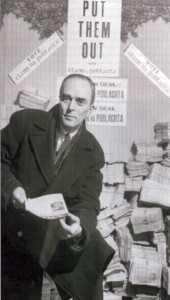‘A menace to the country’
Published in Editorial, Issue 1 (January/February 2015), Volume 23 ‘Something has gone wrong since our friend came into External Affairs . . . From the first day this man’s appalling insincerity struck me as a very positive evil for the country. The worst feature of the situation is that he seems to have fooled quite a lot of people.’
‘Something has gone wrong since our friend came into External Affairs . . . From the first day this man’s appalling insincerity struck me as a very positive evil for the country. The worst feature of the situation is that he seems to have fooled quite a lot of people.’
Ireland’s ambassador to the Holy See, Joseph Walshe, thus described his minister, Seán MacBride, in May 1951. Walshe later wrote that many in Rome considered MacBride ‘a menace to the country’. Both comments are in letters to the archbishop of Dublin, John Charles McQuaid, included in the recently published Volume IX of the Royal Irish Academy’s Documents on Irish Foreign Policy series.
Covering the three years and four months of Ireland’s first coalition government, the ‘interparty government’ led by John A. Costello, DIFP IX reveals MacBride’s years at Iveagh House to have been a strenuous, difficult period for Irish diplomats and damaging to Ireland’s international relations. A minister without prior experience of government, let alone diplomacy, MacBride attempted to place Ireland in the front line on the Cold War world stage without any awareness of the limitations of the state’s geopolitical position and its weak power relationships with Britain and the United States. The results were less than edifying.
McQuaid was well positioned to judge MacBride. The minister for external affairs was a regular corres-pondent, always sycophantic, deferential and servile. In August 1948 he wrote to McQuaid:
‘I cannot adequately express the intense pleasure it gave me to receive Your Grace’s very kind letter conveying our Holy Father’s thanks. I feel, however, that I do not deserve any special thanks. The real work was done by Your Grace, without whose tireless help and intervention I would have been powerless.’
Such fawning was not reserved for McQuaid. To Archbishop d’Alton MacBride wrote:
‘I trust that if at any time any matter arises upon which Your Grace feels disposed to give me advice, formally or informally, that Your Grace will not hesitate to do so. I shall always welcome advice and will be entirely at Your Grace’s disposal.’
So much for the separation of church and state, cabinet government or the republicanism of MacBride’s Clann na Poblachta!
It has long been assumed that the message of ‘filial devotion’ sent by the interparty government to Pope Pius XII on taking office was Taoiseach Costello’s doing. DIFP IX shows that it was in fact MacBride’s, spurred on by the ultra-Catholic Walshe. External Affairs eventually prevailed upon MacBride not to sign the message to Pius XII himself. MacBride was every bit as obsequious as Costello in dealing with the Catholic Church and ran his foreign policy through Archbishop’s House rather than Iveagh House.
MacBride could often display great energy in responding to foreign policy issues. When it seemed that the Communists were heading for victory in the 1948 Italian general election MacBride, also on Walshe’s prompting, used government channels and the Catholic hierarchy to transfer over £50,000 (almost ?2,000,000 in 2014 figures) to Vatican contacts to support the Italian Christian Democrats. In May 1948 he visited Washington DC to negotiate on finances earmarked for Ireland under the European Recovery Program (ERP). American policy-makers maintained that as Ireland was neutral in World War II it should receive loans rather than grants under the ERP. Prompted by MacBride, Irish diplomats convinced the State Department to give Ireland $18 million of grants in addition to $130 million in loans.
MacBride defined a united Ireland as the primary goal of Irish foreign policy. He constantly raised internationally what became known derisively as the ‘sore thumb’ of partition. Here his desire to be a man of action backfired. In a world recovering from global war his approach made Ireland look self-absorbed. It won Ireland few friends and led to a deterioration of Dublin’s already poor relationship with Belfast. Partition remained.
In spring 1949 MacBride privately indicated to the United States that Ireland agreed with the aims of NATO and would join the alliance if Washington first persuaded Britain to end partition. This gamble failed; it underestimated the strength of Anglo-American relations and did not recognise that NATO had sufficient access to facilities in Northern Ireland for Atlantic defence.
Despite the events described above, the interparty government’s foreign policy is generally associated with Costello’s clumsy September 1948 declaration that Ireland was leaving the Commonwealth. MacBride, by contrast, manufactured his public image as the urbane, suave European Cold Warrior, a strong anti-Communist rubbing shoulders with the great statesmen of his age.
As DIFP IX reveals, the reality was rather more prosaic. During MacBride’s final eighteen months in office Irish foreign policy was low-key, largely as a consequence of the decisions taken during 1948 and 1949. With Marshall Aid coming to an end, Dublin had, apart from bilateral relations with fifteen states, little more than the Council of Europe to connect it to the inter-national system. In summer 1951 Ireland was more isolated inter-nationally than when MacBride entered office in 1948. Perhaps Walshe had a point.
Michael Kennedy is Executive Editor of the Royal Irish Academy’s Documents on Irish Foreign Policy series.
















